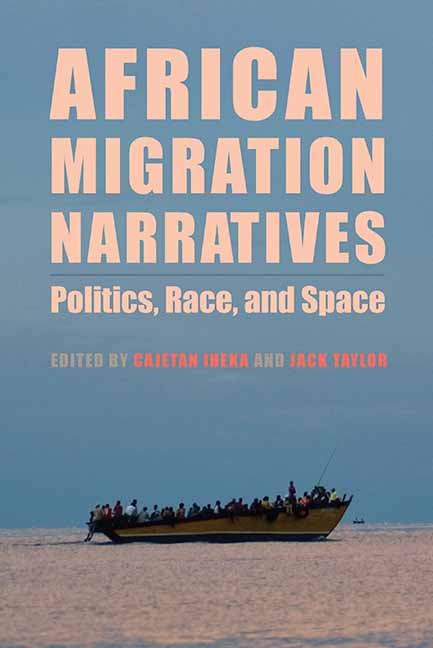Book contents
- Frontmatter
- Contents
- Acknowledgments
- Introduction: The Migration Turn in African Cultural Productions
- Part One African Migration on the Screen: Films of Migration
- Part Two Forgotten Diasporas: Lusophone and Indian Diasporas
- Part Three Migration against the Grain: Narratives of Return
- Part Four Migration and Difference: Indigeneity, Race, Religion, and Poetry at the Margins
- 12 Monkeys from Hell, Toubabs in Africa
- 13 Mapping “Sacred” Space in Leila Aboulela's The Translator and Minaret
- 14 Waris Dirie, FGM, and the Authentic Voice
- 15 Esiaba Irobi: Poetry at the Margins
- Bibliography
- Notes on Contributors
- Index
13 - Mapping “Sacred” Space in Leila Aboulela's The Translator and Minaret
from Part Four - Migration and Difference: Indigeneity, Race, Religion, and Poetry at the Margins
Published online by Cambridge University Press: 26 July 2019
- Frontmatter
- Contents
- Acknowledgments
- Introduction: The Migration Turn in African Cultural Productions
- Part One African Migration on the Screen: Films of Migration
- Part Two Forgotten Diasporas: Lusophone and Indian Diasporas
- Part Three Migration against the Grain: Narratives of Return
- Part Four Migration and Difference: Indigeneity, Race, Religion, and Poetry at the Margins
- 12 Monkeys from Hell, Toubabs in Africa
- 13 Mapping “Sacred” Space in Leila Aboulela's The Translator and Minaret
- 14 Waris Dirie, FGM, and the Authentic Voice
- 15 Esiaba Irobi: Poetry at the Margins
- Bibliography
- Notes on Contributors
- Index
Summary
“No matter what, I will return. This is my base and goal; everything else is variable.”
—Leila Aboulela“I can carry [religion] with me wherever I go, whereas the other things can easily be taken away from me.”
—Leila Aboulela“My idea of religion wasn't about a woman not working or having to dress in a certain way. It was more to do with the faith.”
—Leila AboulelaSome of the primary concerns in Leila Aboulela's fiction are women, faith, and space. These themes are present from her first novel The Translator to Minaret, Lyric's Alley, and The Kindness of Enemies in which her female protagonists are involved in a contest for space, particularly a space to practice their faith as a vital facet of their daily lives, a space that I read here as sacred space. By sacred space, I refer to a concept that moves beyond Mircea Eliade's idea of a space that is distinctly opposed to what he sees as the profane, to a more fluid notion of space that also includes physical and mental spaces that are accommodating, intimate, and life assuring. In this context, sacred space is not tied exclusively to religion, its doctrines and rituals, but is a way of conceiving the world and being-in-the-world that includes one's intimate relationship with loved ones, family, and the community. In both The Translator and Minaret, Aboulela's migration narratives evince a deep concern for the place of her Muslim protagonists in often religious and racially intolerant European societies. In all her novels, her migrant and often out-of-place protagonists seem to undergo a process of rebirth, of having to produce a new life from the brokenness of the old, from the shards of often painful memories. This is enabled, I argue, by their construction and utilization of sacred space. Aboulela shares the view expressed by Amin Malak in the introduction to Muslim Narratives and the Discourse of English that “many Muslims regard religion as a key component of their identity that could rival, if not supersede, their class, race, gender, or ethnic affiliation.” Religion and faith remain central concerns in Aboulela's fiction to the extent that some of her expository passages read like spiritual exhortations.
- Type
- Chapter
- Information
- African Migration NarrativesPolitics, Race, and Space, pp. 222 - 238Publisher: Boydell & BrewerPrint publication year: 2018

